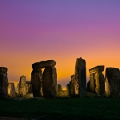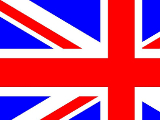
 |
| what is english? | : status ok |
This page tells you about the history of the British Isles and the English language: where it came from, how it developed, why it's changing, and where it might go.
Were you searching the internet for how to learn the English language, and found this page? To start at the beginning, use the go-back link.
| WHAT IS ENGLISH? |
 |
The British Isles is the name for the group of islands that includes, on the larger island, the countries of England, Scotland, and Wales, and, on the smaller island, the countries of Northen Ireland and Southern Ireland. It also includes smaller islands, such as the Isle Of Man and the Isle Of Wight.
The main language in the British Isles was Celtic, until the Romans invaded in 43 BC. Latin then influenced the language for the next 500 years.
Note: The calendar sets the birth of Christ as a reference date, the year zero. International agreement on a reference date does not depend on the date being an agreed fact.
46 years before the reference date is called 46 BC, for Before Christ, and is part of the first century before Christ. 410 years after the reference date is called 410 AD, or just 410, for Anno Domini, Latin for in the year of our Lord, and is part of the fifth century after Christ.
In 410, the Romans left to protect their empire, leaving the Britons to be attacked by the Scots and Picts from the north, the Jutes from northern Denmark, the Angles from southern Denmark, and the Saxons from western Germany.
Celtic communities were destroyed or dispersed, and the languages of all the invaders gradually mixed to become a new language, Old English.
Around 787, the Vikings invaded from Denmark. For the next hundred years, battles alternated with settlement until, in 886, King Alfred finally defeated the Danes and an age of peace, learning, and culture began. For the first time, English, instead of Latin, was used as the main language for teaching, and Old English gradually became Middle English.
In 1066, the Normans invaded from France so, although the general population spoke Middle English, French was used as the language of governement, law, and administration. The English Kings, from 1066 to 1204, spent most of their time in France and probably spoke English poorly, or not at all.
During the wars with France, English increasingly replaced French. It was first used in Parliament in 1362 and, by 1425, was the main language. It largely survived the French influence and many of our basic words remain from Old and Middle English.
The English that developed usually stressed the first syllable. This meant that, in conversation, the last syllable often became less stressed and eventually disappeared. This, and other pronunciation shifts and grammar changes, resulted in Modern English.
Queen Elizabeth 1, 1533-1603, became Queen at 25, and ruled, unmarried, until her death. She loved poetry, music, art, drama, and dancing. Her court became the centre for musicians, scholars, and writers, including Shakespeare. As an island, England developed a sense of independence and exploration, leading to trade, wars at sea, colonies, and wars on land. But at home, in Elizabethan England, a general optimism encouraged innovation in art, literature, music, and science.
The continual changes seemed to prevent any rules for spelling and grammar winning control of the language and, as late as 1700, most people had little idea of correct spelling, and often spelled words differently in the same text. The invention of the printing press did lead to more consistent spelling, but it was Samuel Johnson's English dictionary, published in 1755, that tried to standardise spellings for the first time. Many strange spellings defined then are still used today.
Queen Victoria, 1819-1901, became Queen at 18, and ruled until her death; the longest reign in English history. Progress was rapid and varied, and wars avoided as she was related to royalty in Belgium, Denmark, Germany, Greece, Norway, Rumania, Russia, and Sweden. Victorian England saw engineering, scientific, business, and social advances and, to many, the world seemed stable and peaceful. By 1900, most people believed that English spelling and grammar were fixed for ever.
By the mid-sixties, personal freedoms, and a more relaxed attitude to life and work, began to change the language. Over the next 35 years, English adapted quickly to the partial collapse of the social class system, package holidays, teenagers, subversive magazines, fashion, 24-hour television, cinema, immigration, the internet, and other diverse influences.
Now, in , British English has virtually become International English, the language for business, science, technology, the internet, and travel, and more and more people speak it as a first or second language.
But, underneath this comfortable acceptable English, which you are learning, there are the seeds of a new English: made-up words, mis-used words, no apostrophes, fewer capital letters, interchangeable nouns, adjectives, and verbs, shortened spellings, less punctuation, and an on-the-street code for communicating within a style-group.
This is something to enjoy. We are all part of this process and responsible for it in its fullest variety. If we can still say what we want to say and others can understand it, we will have exactly the language we need.
| WHEN IS IT OK TO SAY UK? |
 |
No other country in the world seems to have so many different names. They're often used incorrectly, so here's the correct explanation:
GB is the abbreviation for Great Britain: the island made up of England, Scotland, and Wales. Scotland and Wales aren't in England. Scottish and Welsh people aren't English. Ireland is the island made up of Northern Ireland and Southern Ireland. Southern Ireland is also called Eire.
The British Isles is the geographical name for the two islands of Great Britain and Ireland, and some smaller islands such as the Isle Of Man and the Isle Of Wight. The Isle Of Man is also called Mann.
UK is the abbreviation for United Kingdom. The UK is a political whole made up of the four countries England, Scotland, Wales, and Northern Ireland, and some small islands. The Isle Of Man is not part of the UK.
Generally, if you were born in England, you're English by birth but British by nationality, and so have a British passport. If you're an immigrant and have a British passport, you're British, not English. My passport is titled The United Kingdom of Britain and Northern Ireland but, inside, says I am a British Citizen. The word Kingdom is used even when there's a queen.
The language spoken is British English, usually just called English. However, sometimes, to make it clear that it is not the English spoken in the US, Canada, Australia, New Zealand, South Africa, India, and other countries, it's called UK English.